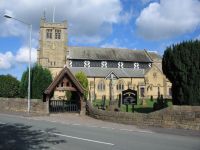Buckley (Welsh: Bwcle [ˈbʊklɛ]) is a town and community in Flintshire, north-east Wales, two miles (3 km) from the county town of Mold and contiguous with the villages of Ewloe, Alltami and Mynydd Isa. It is on the A549 road, with the larger A55 road passing nearby.
Buckley is the second-largest town in Flintshire in terms of population. At the 2011 Census, its community had a population of 15,665. When the contiguous Argoed community is included, Buckley has a population of 21,502.
A prominent nearby landmark is the Hanson Cement kiln just south of the town.
History
Buckley was an Anglo-Saxon location, with some of its houses later recorded in the Norman Domesday Book of the 11th century. However, the first documented evidence of its existence dates from 1294 when it was described as the pasturage of the Manor of Ewloe, spelled as "Bokkeley".
The name Buckley may derive from the Old English bok lee, meaning meadow, or field. The likely meaning of the name was "clearing in a beech wood" (with boc meaning beech tree and ley meaning wood, glade or clearing). The name could also have been construed from bucc, a buck or deer; or bwlch y clai, meaning clay hole.
In 1420, Henry V presented Ewloe and the pastorage of Buckley to his wife, Catherine of Valois, as a wedding present. It was worth £26 per annum.
The town became an industrial heartland for pottery and coal mining between the 17th and 19th centuries. The first was opened in 1737. However, it only grew into any kind of prominence during the Industrial Revolution of the 18th century, when coal and clay were extensively mined there, and the name Buckley became synonymous with the production of various fire-clay and pottery products. By the early 19th century, there were 14 potteries in the town.
Buckley was a popular location for mining, as there were many faults in local rock formations that allowed seams of coal to be mined directly from the surface. Its heavy, clay
